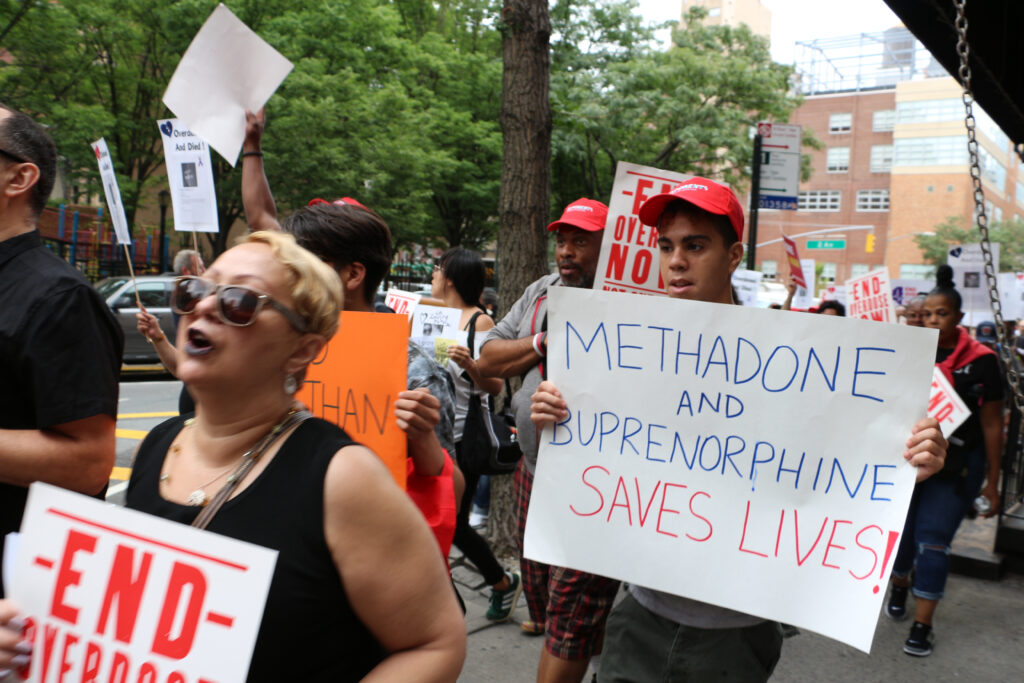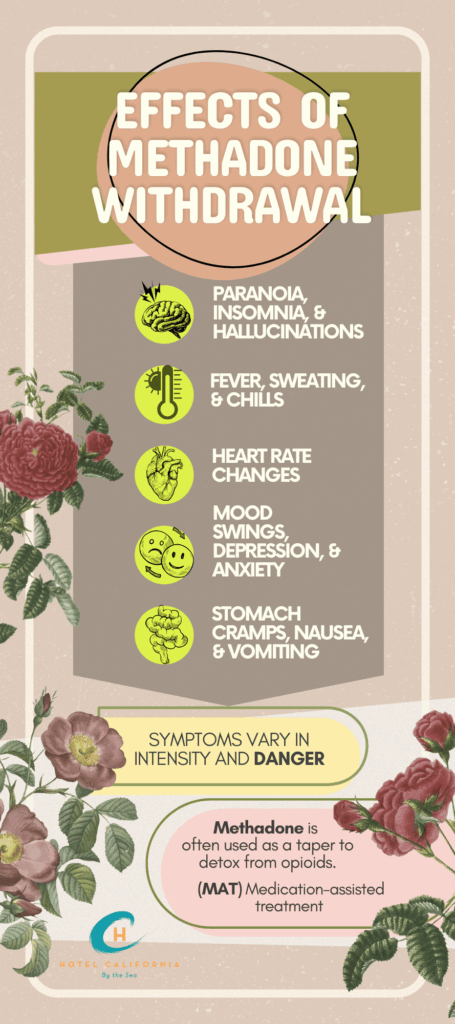Effects of Methadone Withdrawal
Methadone is an opioid medication often used to help treat and manage opioid use disorder. It can be extremely physically addictive, where users can develop withdrawal. The effects of methadone withdrawal are similar to those of other opioid withdrawal symptoms. They also vary in intensity and duration depending on each individual, how much they have taken and how long they have taken the medication. Some people experience withdrawal at higher doses and some people experience withdrawal even at low doses.

Withdrawal is a process that occurs when the body has to readjust and relearn how to function without methadone or other drugs in its system. Inadequate or incorrect dosing of methadone can cause withdrawal. Suddenly stopping methadone treatments can cause withdrawal. And using certain types of medications alongside methadone can cause withdrawal. When the body tries to resume normal functions without the presence of methadone, it results in uncomfortable withdrawal symptoms, which can make detoxing and recovery very difficult.
Methadone withdrawal can be very intense and even cause adverse symptoms to arise. It is not recommended to attempt it on your own. Despite its addictive nature, methadone is still often used in treating those who are addicted to stronger opioids such as heroin and fentanyl.
What is Methadone?
Methadone is most commonly used in medication-assisted treatment (MAT) as a taper medication to help patients gradually detox from opioids. When used correctly as per the recommendation of a healthcare provider, it can be very effective in helping patients quit opioids such as heroin and other prescription painkillers.
It is a long-acting synthetic opioid that can remain active in the system anywhere from 8 to 59 hours in the body. Because of its long-acting nature, this makes it ideal for users who are tapering off opioids. It can help ease and reduce symptoms of withdrawal while still being able to treat chronic pain.
Opioids are powerful substances that affect your brain and flood it with neurotransmitters like dopamine. During and after detox, your brain begins functioning with depleted storage of neurotransmitters like dopamine. It can take up to 6 months for the brain to readjust and return to normal after experiencing an opioid addiction.
When on methadone treatment, patients usually stay on for about 12 months. Some take the medication for years and slowly taper. It is effective in most cases of opioid addiction and helps to prevent drug overdose deaths every year. The biggest drawback to this type of therapy is the occurrence of intense withdrawal symptoms.

Why is Methadone popular for Opioid Use Disorder?
- Methadone helps to satisfy opioid cravings without producing an opioid-like high and euphoria
- Methadone does not cause impairment or permanent damage to the brain and body
- Methadone is highly regulated so it is not cut with dangerous or unknown substances
- Methadone is legally obtained through a certified clinic – due to the risks of misuse, methadone therapy is only available to those enrolled in a government-approved treatment program where they will be monitored by a professional healthcare provider
- Methadone is an opioid that is difficult to overdose on when taken as prescribed
Effects of Methadone Withdrawal
- Fever, sweating and chills
- Anxiety and depression
- Muscle aches
- Nausea and vomiting
- Rapid heartbeat
- Stomach cramps and abdominal pain
- Irritability and mood swings
- Paranoia
- Drug cravings for methadone
- Insomnia
- Hallucinations
- Runny nose and watery eyes
Physical and psychological withdrawal symptoms from methadone can be overwhelming and can even lead to drug relapse. This is especially common with unmanaged withdrawal. It can increase significant health risks.
Post-acute withdrawal or protracted withdrawal symptoms (PAWS) can begin in the weeks following methadone detox. It is a common occurrence for those who misuse opioids for a long period of time.
The risk of dehydration and malnutrition is also common among those experiencing methadone withdrawal. This is due to the vomiting, diarrhea and inability to keep down food and fluid. Dehydration leads to electrolyte imbalance in the body, which can also lead to cardiovascular complications and death.
Acute withdrawal symptoms usually last up to 14 days. However, many also report experiencing post-acute withdrawal symptoms, which can last for months after detox.
Check Your Insurance Coverage for FREE
Find out if your insurance covers addiction treatment in minutes. We accept most insurance!
Methadone Withdrawal Timeline
Symptoms of methadone withdrawal generally appear within 24-36 hours after the last dose. It can take anywhere from 5 to 60 hours for the methadone to leave the system. Because it is a long-acting opioid, it can remain in the body for much longer. This means withdrawal often doesn’t happen until about a week after the last dose was taken. The total duration of withdrawal can last anywhere from 2-3 weeks to up to 6 months, depending on the individual.
The first week or so of methadone detoxification is usually when the worst symptoms of withdrawal are experienced. In the first few days, physical symptoms such as fever, chills, rapid heartbeat and muscle aches can occur.
Days 3-8 are when users experience strong methadone cravings, anxiety, body aches, nausea, insomnia, irritability and flu-like symptoms. It can take a few days for the symptoms to peak and then additional symptoms such as depression, vomiting and cramps can occur.
By day 9-15, users can expect diarrhea, irritability and continued physical discomfort. Strong drug cravings and depression will intensify.
At day 15 and beyond, users will experience low energy, difficulty sleeping and continuous drug cravings that can go on for weeks. After about 6 weeks or so, acute symptoms will end and the person will have officially detoxed from methadone. However, in those with severe addictions, they may experience PAWS.
Ways to manage Methadone withdrawal symptoms
- Keep yourself hydrated
- Keep yourself occupied with activities – create distractions and a temptation-free environment to help reduce the risk of relapse
- Stay physically active – keep an eye on your physical health to reduce the risk of other serious issues and complications
- MAT using medications such as clonidine, buprenorphine and naloxone
- Cognitive therapies
- Gradual taper
- Join a support group – psychological and emotional support are important to help patients navigate withdrawal and develop healthy coping strategies
- Restart methadone at a lower dose
- Education – knowing what to expect can make the process feel less overwhelming and intimidating
Reach out to Hotel California by the Sea
We specialize in treating addiction and other co-occurring disorders, such as PTSD. Our Admissions specialists are available to walk you through the best options for treating your addiction.
Treatment for Methadone Addiction
Methadone is a popular opioid medication used in the treatment of opioid use disorder and those who have an addiction to heroin, fentanyl and stronger types of opioids. Despite its effectiveness in helping treat opioid addiction, the medication itself can become very physically addictive. It can cause serious withdrawal symptoms. When methadone is discontinued or drastically cut down, it can cause the user to go into withdrawal.
A professional behavioral treatment program such as Hotel California by the Sea, provides an all-encompassing view of addiction treatment. We offer treatment for alcohol use disorder and substance use disorder such as addiction to opioids like methadone. We offer treatment at all levels of care including detox, residential, PHP and IOP. We utilize evidence-based methods such as CBT, DBT and EMDR therapy. Hotel California by the Sea is dedicated to helping our clients reach their goals for sobriety and overcome their addiction.
References:
https://www.addictioncenter.com/opiates/methadone/withdrawal-detox
https://www.hanleycenter.org/methadone-withdrawal
https://www.drugs.com/medical-answers/long-methadone-withdrawal-3543797
https://www.healthline.com/health/going-through-methadone-withdrawal
https://www.verywellmind.com/methadone-withdrawal-4178352
https://www.medicalnewstoday.com/articles/methadone-withdrawal


